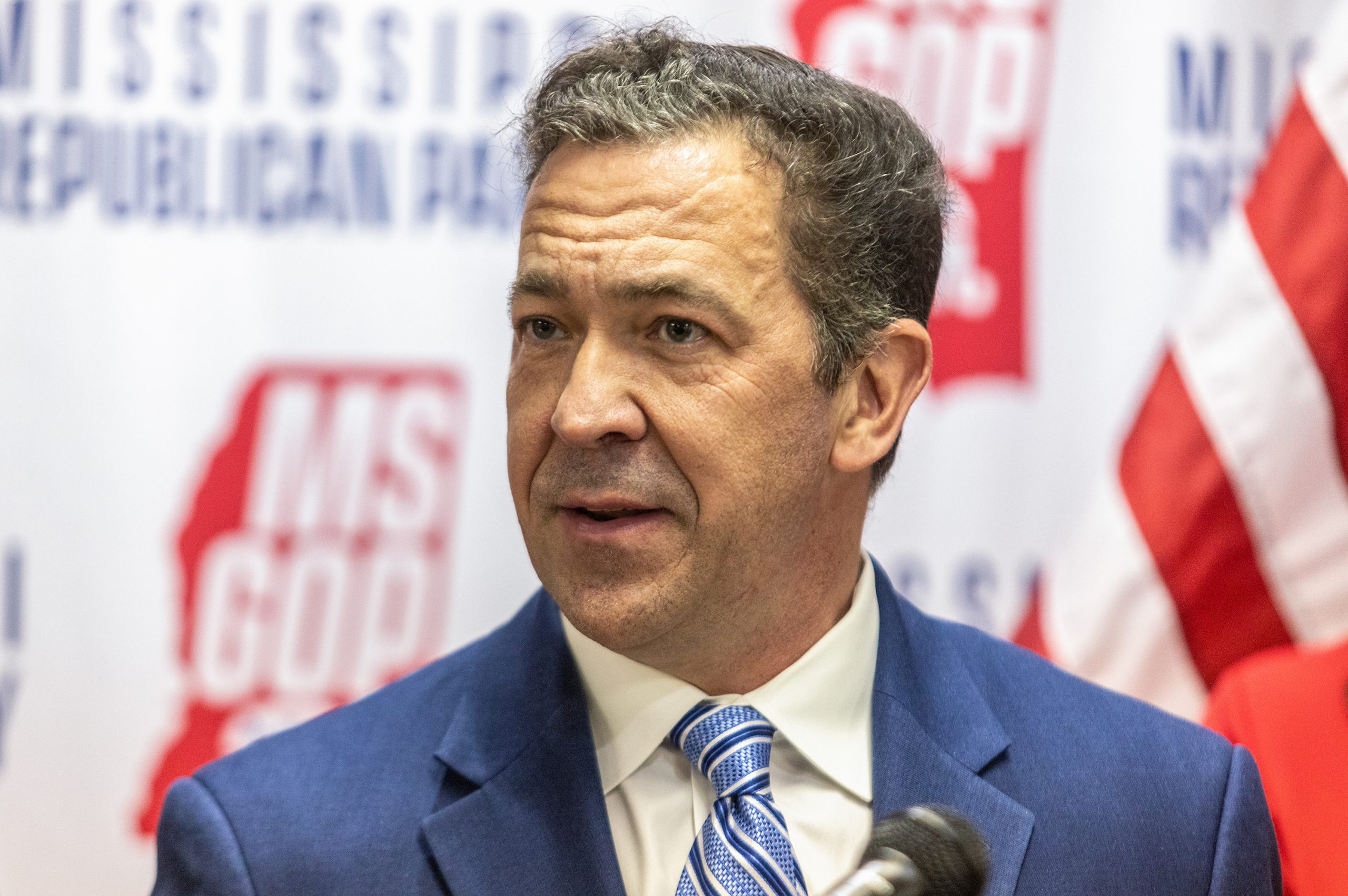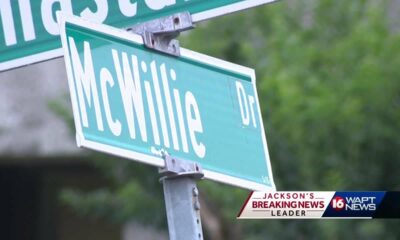Mississippi Today
Chris McDaniel returns questionable campaign donations, shuts down PAC. Hosemann complaint with AG pending

Chris McDaniel returns questionable campaign donations, shuts down PAC. Hosemann complaint with AG pending
Lieutenant governor candidate Chris McDaniel has reported returning legally questionable large donations from a Virginia dark-money nonprofit, and shutting down his PAC through which the donations flowed to his campaign.
McDaniel's Hold the Line PAC has reported it returned $460,000 to the American Exceptionalism Institute nonprofit corporation and closed out the PAC. This came days after McDaniel's campaign account returned $465,000 to Hold the Line.
McDaniel's Hold the Line PAC campaign finance public filings and subsequent explanations and amended reports have been confounding. Hold the Line initially failed to list the source of hundreds of thousands of dollars and its reports have had amounts and dates that don't add up. For instance, Hold the Line reported having raised hundreds of thousands of dollars the year before McDaniel legally registered it with the secretary of state's office, and failed to list the source of that money as required by law.
McDaniel's PAC was the largest contributor to his lieutenant governor campaign, donating $465,000 of the $710,000 his campaign reported raising last year.
Oddly, in some of its latest filings, Hold the Line reported it returned $460,000 to American Exceptionalism Institute on the same day it received the second of two donations of $237,500 from AEI, in February. But McDaniel's campaign had reported it received a total of $465,000 from Hold the Line in January, before the PAC would have had that much money — primarily coming from AEI — per its own reports.
When questioned about this, McDaniel's camp declined comment, but filed an amended report changing the date of the second donation to mid-January. Even with multiple amended reports, it appears McDaniel's PAC received $475,000 from AEI but returned only $460,000 to the nonprofit corporation.
READ MORE: Hosemann accuses McDaniel of ‘clear violations' of law with campaign money
Lt. Gov. Delbert Hosemann's campaign has a complaint pending with the attorney general's office that includes claims that McDaniel's PAC and campaign violated Mississippi law, which prohibits a corporation from donating more than $1,000 in a single year to a candidate or PAC and requires listing of sources of donations.
Hosemann campaign adviser Casey Phillips in a statement said: “Chris McDaniel's campaign is based on a lie, staffed with Democrat operatives, and funded with illegal money. Election integrity includes campaign finance transparency. McDaniel would know that if he bothered to show up to vote when the Senate passed the election security package. Instead, he is blatantly disregarding Mississippi's election laws.”
A spokeswoman for Attorney General Lynn Fitch's office, asked for comment on Hosemann's campaign finance complaint, said only, “We are reviewing it.”
A Mississippi Today article in February pointed out McDaniel's financial reports for his campaign and PAC left voters in the dark about the source of hundreds of thousands of dollars and raised questions about whether donations violated state law.
McDaniel, a four-term state senator, has vocally called for stricter campaign finance laws and more transparency in the sources of campaign money. But when questioned about his campaign and PAC finances, he said he knows scant details about them, has deferred questions to staffers and chalked up any discrepancies to “clerical errors.”
McDaniel initially deferred questions to the Rev. Dan Carr, a pastor and political consultant from Gulfport listed as treasurer of the Hold the Line PAC. Carr, mostly by text messages, gave a series of confusing and conflicting statements that never explained what the clerical errors were, or the source of the large amount of unaccounted for donations to Hold the Line.
McDaniel's campaign last month said that U.S. Supreme Court rulings on federal campaign finance issues nullify Mississippi's law banning corporate contributions over $1,000. But a spokeswoman said McDaniel's campaign and PAC would be returning American Exceptionalism Institute donations “to avoid a protracted legal fight with the establishment.”
Hosemann filed his campaign finance complaint against McDaniel last month with the secretary of state's office. Records show the secretary of state's office, citing its lack of investigative and prosecutorial authority, forwarded the complaint to the criminal investigations division of the attorney general's office.
An intentional violation of the campaign finance disclosure law is a misdemeanor with a
maximum penalty of $3,000, six months imprisonment, or both. But in Mississippi, campaign finance laws are seldom enforced, and alleged violations seldom investigated or prosecuted.
Hosemann, former secretary of state, is seeking a second and final term as lieutenant governor overseeing the state Senate. McDaniel is a four-term state senator who has run twice unsuccessfully for U.S. Senate.
This article first appeared on Mississippi Today and is republished here under a Creative Commons license.
Did you miss our previous article…
https://www.biloxinewsevents.com/marker-honoring-fannie-lou-hamer-set-for-unveiling-in-husbands-hometown/
Mississippi Today
On this day in 1983


May 6, 1983

A federal judge sentenced Raymond Bledsoe to life for beating Black jazz saxophonist Steven Harvey to death in a Kansas City park because of his race.
A Missouri jury had acquitted Bledsoe of murder, and afterward, he reportedly bragged to his girlfriend about killing a “n—–” and getting away with it.
Harvey's family members, Alvin Sykes and the Steve Harvey Justice Campaign convinced federal authorities to pursue the case. At the time, the conviction was reportedly the fourth under the Civil Rights Act of 1968.
In 2013, federal corrections authorities denied parole to Bledsoe. To date, he remains the longest serving inmate convicted under that Civil Rights Act.
Sykes later helped bring about both the Justice Department's reopening of the Emmett Till case and the passage of the Emmett Till Unsolved Civil Rights Crime Act.
Sykes died in 2021, and his New York Times obituary read, “Though he never took a bar exam, Mr. Sykes was a brilliant legal and legislative operator whose admirers included City Council members, politicians and U.S. attorneys general from both parties. … He led a monk's life in the name of social justice. He rarely held a job, wore second hand clothing and lacked a permanent address for long stretches of time, staying with friends instead and living off donations and, later, speaker fees. He never learned to drive and so walked everywhere, most often to the reference section of the library in Kansas City, Missouri, where he did his research, or to a booth at a restaurant that he used as an informal office, his papers surrounded by cups of coffee and stubbed-out cigarettes.”
This article first appeared on Mississippi Today and is republished here under a Creative Commons license.
Mississippi Today
Podcast: How the 2024 Medicaid expansion debate died

Mississippi Today's Adam Ganucheau, Bobby Harrison, Geoff Pender, and Taylor Vance discuss the breakdown of Medicaid expansion negotiations in the Legislature.
This article first appeared on Mississippi Today and is republished here under a Creative Commons license.
Did you miss our previous article…
https://www.biloxinewsevents.com/?p=355689
Mississippi Today
On this day in 1917
May 5, 1917

Eugene Jacques Bullard became the first Black American combat pilot.
After the near lynching of his father and hearing that Great Britain lacked such racism, the 12-year-old Georgia native stowed away on a ship headed for Scotland. From there, he moved to Liverpool, England, where he handled odd jobs before becoming a boxer, traveling across Europe before he settled in Paris.
“It seems to me that the French democracy influenced the minds of both White and Black Americans there and helped us all to act like brothers as near as possible,” he said. “It convinced me, too, that God really did create all men equal, and it was easy to live that way.”
When World War I began, he was too young to fight for his adopted country, so he and other American expatriates joined the French Foreign Legion. Through a series of battles, he was wounded, and doctors believed he would never walk again.
No longer able to serve in the infantry, an American friend bet him $2,000 that he could not get into aviation. Taking on the challenge, he earned his “wings” and began fighting for the French Aéronautique Militaire.
He addressed racism with words on his plane, “All Blood Runs Red,” and he nicknamed himself, “The Black Swallow of Death.”
On his flights, he reportedly took along a Rhesus monkey named “Jimmy.” He tried to join the U.S. Air Service, only to be turned away because he was Black. He became one of France's most decorated war heroes, earning the French Legion of Honor.
After the war he bought a Paris nightclub, where Josephine Baker and Louis Armstrong performed and eventually helped French officials ferret out Nazi sympathizers. After World War II ended, he moved to Harlem, but his widespread fame never followed him back to the U.S.
In 1960, when French President Charles de Gaulle visited, he told government officials that he wanted to see his old friend, Bullard. No one in the government knew where Bullard was, and the FBI finally found him in an unexpected place — working as an elevator operator at the Rockefeller Center in New York City.
After de Gaulle's visit, he appeared on “The Today Show,” which was shot in the same building where he worked.
Upon his death from cancer in 1961, he was buried with honors in the French War Veterans' section of the Flushing Cemetery in Queens, New York.
A sculpture of Bullard can be viewed in the Smithsonian National Space and Air Museum in Washington, D.C., a statue of him can be found outside the Museum of Aviation, and an exhibit on him can be seen inside the National Museum of the U.S. Air Force, which posthumously gave him the rank of a second lieutenant. He is loosely portrayed in the 2006 film, “Flyboys.”
This article first appeared on Mississippi Today and is republished here under a Creative Commons license.
-
SuperTalk FM4 days ago
Driver’s education set to become mandatory in Mississippi as bill passes
-
SuperTalk FM7 days ago
Festival merger in Leland sets up one major event for Mississippi Delta
-
SuperTalk FM3 days ago
State approves $160M to expand Highway 7 to four lanes in Lafayette County
-
Mississippi Business5 days ago
Geartek expanding operations in Alcorn County
-
Mississippi News6 days ago
Two women accused of shoplifting across southeast captured in Mississippi
-
Mississippi News4 days ago
Altercation at Mississippi police department leads to officer-involved shooting
-
Mississippi News6 days ago
Starkville police make arrest in shooting at Dawg Wash South
-
Mississippi News17 hours ago
Winston Co. Sheriff’s Office investigates shooting at Dave’s Club






































